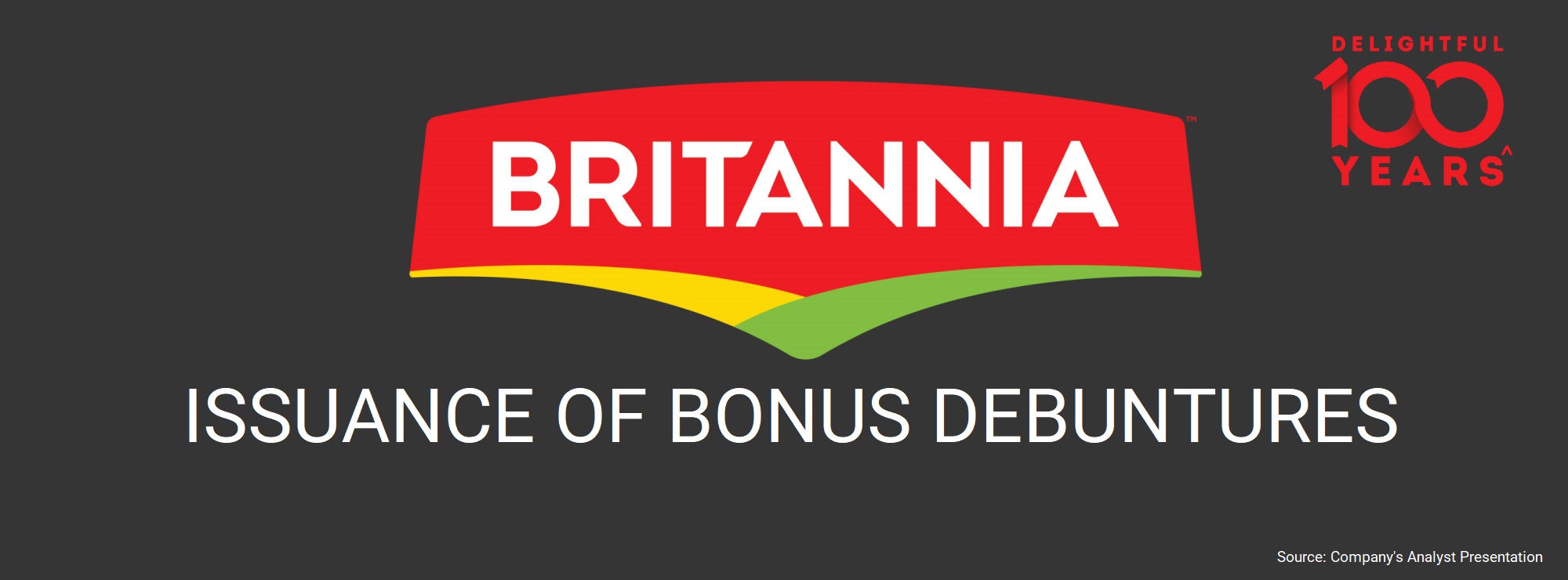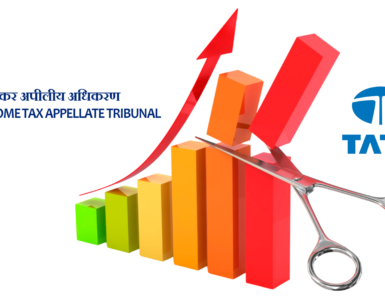Britannia Industries Limited (Company) has vide its Scheme of Arrangement with its members has proposed for issue of Secured Non-Convertible Fully Paid-Up Debentures by way of bonus to the members as on record date out of the accumulated profits lying to the credit of its Profit & Loss Account.
Reasons/Rationale for the Scheme
The Company is finding that it has cash more than its needs. Investing such cash as treasury investments, in the ultimate analysis will lead to dilution of yields on capital employed in the business, particularly in a scenario of falling interest rates. The Company intends to return its retained earnings to its members by restructuring its reserves & surplus. Hence by way of converting the reserves into Debentures, on one hand, it would be able to transfer the funds to its members on repayment of debentures and on the other hand, it can use the funds in present for its specified purposes. The scheme does not involve in reduction of issued, subscribed and paid-up share capital of the company.
Company has ascertained that even after conversion of reserves& surplus into Debentures, company will have enough cash balance to discharge its liabilities towards creditors on time and in the ordinary course of business.
Terms of bonus Debentures
Company will issue 1 fully paid up 8% secured redeemable debenture of Rs. 30/- each against 1 fully paid up equity share of Re. 1/- each held by the members on Record date on pro rata basis to all the members of the company out of acumulated profits. To effectuate the transaction, the company has proposed Scheme of Arrangement between the Company and its members pursuant to section 230 to Section 232 of the Companies Act, 2013 which is subject to the approval of NCLT, Members, Creditors, RBI and other specified authorities.
Appointed Date
The Appointed Date is considered as 31st March, 2018 and it is only for determining accumulated profits out of which amount will be allocated to issue debentures.
Record date
Record Date will be the date after NCLT approval to be fixed by the Board of Directors.
Process for Issuance of Debentures
- Debentures will be issued within 30 days from Record Date by way of Transfer of 720 Crores to Merchant Banker as amount equal to aggregate value of Debentures required to be issued, through Escrow Account. This will be treated as company’s payment to each member.
- Merchant banker will pay again to the Company on behalf of eligible member for getting debentures out of the escrow account as a subscription amount for allotment of debentures. Cost of acquisition of debentures for each member is the face value of the debenture.
- Company will make allotment of debentures to the members as follows:
- Company will not issue Letter of allotment to the allottees.
- Allotment in demat form to the members whose equity shares are in demat form or to those members from whom co. has received a written notice prior to record date intimating their demat account details.
- Allotment in physical form to the members whose equity shares are in physical form.
- In case of shares transferred to IEPF account, debentures being deemed dividend will also be credited to IEPF demat account or Debenture Certificate will be issued in the name of IEPF.
Consequential & Structural changes: Amendment in Articles
As an integral part of the Scheme, the company has also proposed amendment in its Articles of Association by insertion of New Article 136.A.: Capitalization of Reserves and treatment of undivided profits to enable the Company to capitalize its reserves for creation of debentures or shares or making unpaid shares as fully paid up.
Issue of Debentures to Non-Resident Members:
As per Regulation 9(2) of the Foreign Exchange Management (Transfer or Issue of Security by a Person Resident outside India) Regulations, 2017 issued vide RBI Notification No” 20 (R)/2017RB dated November 7, 2017 (as amended up to April 6, 2018), Indian Company can issue nonconvertible redeemable debentures to nonresident members by way of bonus out of its General Reserves. However, this is to be done through a scheme of arrangement approved by NCLT or any other appropriate authority and further subject to the terms and conditions of the Notification. Additionally, any further sale of the debentures by the nonresident member or repatriation of money received from the sale will be subject to the applicable laws of India and laws of their country of residence.
As per the SEBI and RBI Regulations, company must list its debentures with Stock Exchange within 15 days after issuance. If the debentures could not be listed within the said 15 days, then in case of those Non-Resident Members who cannot hold the debentures beyond such 15 days as per the applicable SEBI and RBI Regulations, company must either buy back or redeem their debentures or arrange for third parties to purchase their debentures.
Issue of Debentures to Employees on their stock options
Employees who have exercised their stock option on or before the Record Date will only be eligible for allotment of Debentures
Stamp duty on Order
It is stated that since this Scheme does not involve conveyance as per the Indian Stamp Act 1899 applicable to Kolkata (West Bengal) or transfer of property and does not relate to merger or amalgamation in terms of Sec. 230-232 of the Act, Stamp duty will not be payable on NCLT Order sanctioning the scheme but the stamp duty will be paid on an instrument/deed/NCLT Order pertaining to issue and allotment of Debentures.
Priority in repayment
Claims of the Debentures holders being secured debentures will get priority than the claims of the unsecured creditors and will rank equally with the other secured creditors.
Redemption of Debentures
The Debentures will be redeemed on the 3rd anniversary of the date of their allotment.
Conclusion
It is the scheme by which company decides to pay special dividend to its shareholders in its 100th year. Generally, issue of debentures is considered as deemed dividend under Sec 2(22) (b) of The Income Tax Act.1961 and hence liable to pay dividend distribution tax. But under Sec 123 of The Companies Act, 2013 or any of the provisions of the act this issuance of debentures is not considered as dividend and Companies (Declaration and payment of dividend) Rules, 2014 are not applicable.
In case of non-listing of debentures within 15 days of issuance, company must redeem or buy back the debentures allotted to the Non-Resident Members who are not allowed to hold such debentures beyond 15 days or arrange for third parties to purchase the same. Here, since debentures are given as a bonus by utilizing co.’s own reserve, how buyback or redemption will hold good and how will the company pay cash to those members for buyback/redemption which are not actually purchased by them is not clarified in the scheme.
The Debentures being secured have been exempted from being treated as Deposits stating that as per Chapter V of the Companies Act, 2013 read with the Companies (Acceptance of Deposits) Rules, 2014 they will be secured by First charge or a charge paripassu with the First charge on movable or immovable assets of the company. However as per the Rule 2(1)(ix) of the Rules, it is also to be ensured that the debentures shall not exceed market value of such assets as assessed by a Registered Valuer, which is not provided in the scheme.





Add comment